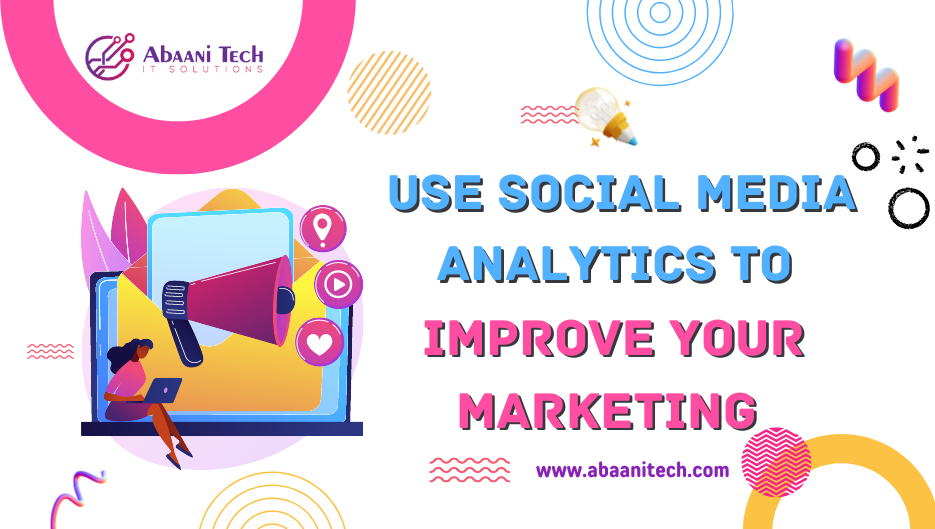Use Social Media Analytics to Improve Your Marketing


In today’s digital age, social media analytics has become a powerful tool for businesses to connect with their target audience and promote their products or services.
However, the key to successful social media marketing lies in not only creating compelling content but also in analyzing the data and insights provided by social media analytics.
These valuable metrics can provide invaluable insights into your audience’s behavior, preferences, and engagement patterns, helping you fine-tune your marketing strategies for maximum impact.
In this article, we’ll delve into the world of social media analytics and explore how you can leverage them to enhance your marketing efforts.
In the vast landscape of social media, analytics serve as a compass, guiding marketers toward data-driven decisions that can significantly enhance their campaigns. By gleaning insights into audience behavior and content performance, you can optimize your marketing strategies for maximum engagement and conversion.
The Importance of Social Media Analytics
Social media analytics isn’t just about tracking numbers; it’s about deciphering the story behind those numbers. The data you gather provides a deeper understanding of your audience’s preferences, allowing you to tailor your content to resonate with them.
Setting Up Your Analytics Tools
Before delving into the data, it’s crucial to set up your analytics tools effectively. Choose a reliable analytics platform and seamlessly integrate it with your social media accounts to ensure accurate data collection.
1. Choosing the Right Analytics Platform
Selecting the right analytics platform depends on your business goals and the social media platforms you use. Platforms like Google Analytics and social media insights provide valuable data on user engagement, demographics, and more.
2. Integrating Analytics with Your Social Media Accounts
To gather comprehensive insights, integrate your chosen analytics tools with your social media accounts. This integration enables seamless data collection, giving you a holistic view of your social media performance.
Key Metrics to Track
Several key metrics offer a comprehensive view of your social media performance and audience engagement.


1. Engagement Metrics (Likes, Comments, Shares)
These metrics gauge how well your content resonates with your audience. Higher engagement rates indicate content that strikes a chord with users.
2. Reach and Impressions
Reach represents the number of unique users who see your content, while impressions indicate the total number of times your content is displayed. Analyzing these metrics helps you understand the extent of your content’s visibility.
3. Click-Through Rate (CTR)
CTR measures the effectiveness of your call-to-actions and links. A high CTR indicates that your content successfully drives users to take the desired action.
4. Conversion Rate
Conversion rate measures the percentage of users who complete a desired action, such as making a purchase or signing up for a newsletter. Tracking this metric enables you to evaluate the effectiveness of your marketing campaigns.
Understanding Audience Insights
Delving deeper into your audience’s characteristics and behavior can refine your marketing strategies.
1. Demographic Data
Understanding your audience’s age, gender, location, and interests helps you tailor content that resonates with them.
2. User Behavior and Preferences
Analyze how users interact with your content. Do they prefer videos, images, or text? This insight helps you create content that aligns with your preferences.
3. Peak Activity Times
Identifying when your audience is most active enables you to schedule your posts for maximum visibility and engagement.
Analyzing Content Performance
Understanding which types of content perform best can guide your content creation strategy.
1. Identifying Top-Performing Content
Analyze metrics to identify the content that garners the most engagement and conversions. This data-driven approach can inform your future content decisions.
2. Content A/B Testing
Experiment with different types of content and posting strategies through A/B testing. This approach allows you to refine your content strategy based on real-time data.
Competitor Analysis
Benchmarking your performance against competitors can uncover valuable insights.
1. Benchmarking Against Competitors
Compare your social media metrics to those of your competitors to gauge your market positioning.
2. Learning from Their Strategies
Identify successful tactics used by competitors and adapt them to your own campaigns, while also differentiating yourself through unique approaches.
Adapting Your Marketing Strategy


Armed with data-driven insights, it’s time to refine your marketing approach.
1. Refining Content Strategy
Adjust your content strategy based on the types of content that generate the most engagement and conversions.
2. Optimal Posting Frequency
Use data to determine the ideal posting frequency for each platform, ensuring consistent engagement without overwhelming your audience.
3. Tailoring Content for Different Platforms
Different social media platforms have distinct user behaviors and preferences. Tailor your content to each platform for optimal results.
Measuring ROI and Impact
Ultimately, your social media efforts should contribute to your bottom line.
1. Linking Analytics to Business Goals
Align your social media goals with your broader business objectives. Measure how social media contributes to lead generation, sales, and brand awareness.
2. Tracking Conversions and Sales
Use analytics to track the customer journey from social media interaction to conversion. This data helps you measure the direct impact of your efforts.
Overcoming Challenges
Navigating the world of social media analytics comes with its share of challenges.
1. Dealing with Data Overload
While data is valuable, sifting through excessive amounts can be overwhelming. Focus on the metrics that directly align with your goals.
2. Adapting to Algorithm Changes
Social media algorithms evolve, impacting how your content is displayed. Stay updated on algorithm changes and adjust your strategy accordingly.
Staying Updated
The digital landscape is ever-changing; staying informed is essential.
1. Keeping Abreast of Industry Trends
Regularly monitor industry trends and adapt your approach to align with emerging best practices.
2. Evolving Your Analytics Approach
As social media platforms and tools evolve, continuously update your analytics strategy to ensure you’re capturing relevant data.
Conclusion
Social media analytics serve as a compass in the vast landscape of digital marketing. By harnessing the power of data, you can refine your strategies, engage your audience, and drive meaningful results. Embrace the insights provided by social media analytics and pave the way for more effective and impactful marketing campaigns.
Want the best social media strategy?
Try our services at AbaaniTech to get the results!!
FAQs
- What is the primary goal of social media analytics?
Social media analytics help businesses gain insights into their audience’s behavior and preferences, allowing them to tailor their marketing strategies for maximum engagement and conversion.
- Which metrics are crucial for measuring content performance?
Engagement metrics (likes, comments, shares), reach, impressions, click-through rate (CTR), and conversion rate are essential metrics to track content performance.
- How can I adapt my content strategy for different social media platforms?
Different platforms have varying user behaviors and preferences. Tailor your content format and messaging to align with each platform’s unique characteristics.
- What challenges do marketers face with social media analytics?
Marketers may struggle with data overload and adapting to algorithm changes. Focusing on relevant metrics and staying updated on algorithm shifts can help overcome these challenges.
- Why is tracking ROI important in social media marketing?
Tracking ROI allows you to measure the tangible impact of your social media efforts on lead generation, sales, and overall business objectives.






